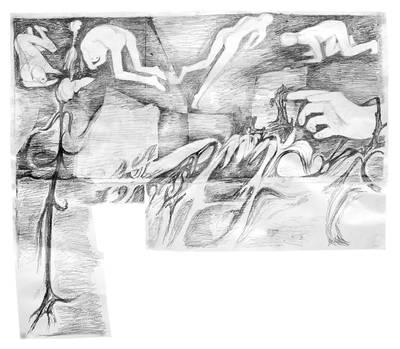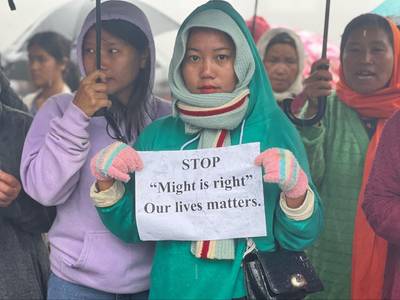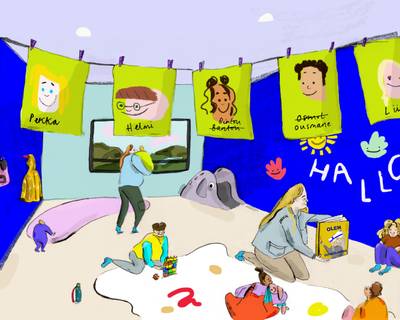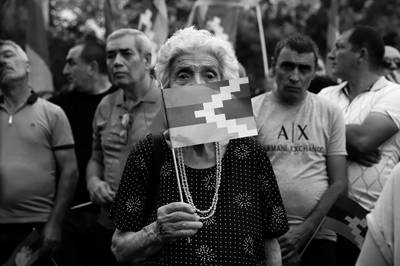

The building of "Sons of Life ‘’ school. Photo by Shahi Derky, Mersin, 2013.
Shahi Derky (b. 1997) is a filmmaker and a linguistics student, working on connecting images, languages, and collective memory.
To find yourself in a new Syrian school, established in a residential building in Turkey, that teaches the Libyan curriculum to freshly-arrived Syrians, makes you want to tell stories about it.
I grew up in Damascus, in schools where students wanted to seize any opportunity to leave class, whether they were on a mission to take the heater’s small container and fill it with oil, or to borrow chalk from the other classroom, which seemed to always have an endless supply. The kind of schools where jokes and unseriousness are the common act, with discipline being the mother tongue used to silence our lives that resembled little ignored secrets. Somehow, there, all secrets are public and known to everyone, yet unspoken, as secrets tend to be.
We knew that we might leave the country, but we didn’t know when, so I stopped doing my homework and I started gathering my memories instead.
Damascus 2011–2012
Many things started to change before our eyes in Damascus. We would hear bombs, see smoke or things that resembled firework and be impacted or not at times, by the secrets that refused to be unspoken anymore, bleeding under the feet of all Syrians. It was my first year in high school. Gradually, the discipline lost its charisma, and we all realised that there was something else going on that was more important than a math class. Sometimes teachers couldn’t make it to school due to security reasons, so we would take the day off and live our teenage gossip and fun. Or we would discuss political things.
Every term, every expression, every joke, every routine, every school material, everything we used to live by was put into question now. Nothing resembled its older self anymore. We knew that we might leave the country, but we didn’t know when, so I stopped doing my homework and I started gathering my memories instead. After the summer break, I wasn’t able to answer the question addressed to me several times: “How’s your preparation for school?”. The more we were approaching our unsure departure (unsure because we didn’t know when, but deep down and silently we knew that it was coming), the more I would become a guest in my own school, in my own city, in my own country. Day by day, I would go to class to sit next to a friend, or to eat one last cheese croissant, or to gaze at the teacher one last time, not as someone concerned by this anymore. I was living the same routine, but something was separating me from this routine every day. If I had to describe it, I would imagine myself growing out of my life in Syria while I was still there, revisiting it and seeing myself doing the same things, saying goodbye silently to things and people who didn’t know I was bidding them farewell.
We had the idea that we would leave Damascus temporarily, so we stayed in neighboring countries; Erbil in Iraqi Kurdistan, then Mersin in Turkey, convincing ourselves that we would be back, unconsciously so, to make it easier for us to leave in the first place.
Erbil, 2013
It was on that bluish indoor afternoon that a friend from Damascus told me that there was a new Syrian school opening up in Mersin. When I announced the news to my family, who was already wondering where to settle next, the idea became reality within seconds, and some minutes later, the news turned into four people looking up Mersin photos on Google. Our new wishes started popping up along with each image, like the 5-Turkish-lira fish sandwich that, now I can safely say, we encountered only on Google that dreamy and decisive afternoon.
The three cities consisted of one hometown and two consecutive attempts to have a hometown. Then I met a lot of other people who were making that same attempt.
Mersin 2013 - 2014
After the 18-hour bus ride from Kurdistan to Turkey, after the night walks that weren’t short of me trying to learn the numbers in Turkish and wondering how I could memorize all that, after establishing the first encounter with the neighbourhood’s grocery store keeper who was curious where that not-enough-vocabulary-girl came from, and after spending the summer trying to capture the neighbour’s Wi-Fi from the balcony to continue, with my friends in Damascus, the conversations that hadn’t yet been concluded… I arrived at my new school.
It was a red-and-white residential building situated at the end of an impasse not too far from the beach. There were many trees behind it, and the only thing separating us was a fence.The asphalt between the trees and the main street hosted all our breaks, lunches, and noises. In the building that was designed to be a residential one as hoped by its architects, the living rooms and bedrooms constituted our classrooms, the kitchen was strategically the teachers’ room, and the toilets remained as such. Balconies and automatically-locked doors constantly reminded us that we were in potential homes and that, according to the building, maybe, we were just some people who only had to bring white boards and chairs with them and continue where they had left off last.
With a pink shirt, wide jeans, and a vague idea of what to expect from a potential uniform, I was in front of my classroom’s door which had a paper sign on it that said, “Baccalaureate, boys”. Ignoring it, I entered and sat down. My gaze was drawn to the empty wall area above the board; no president, no map, no flag. It felt like seeing someone without their eye-glasses for the first time.
My gaze was drawn to the empty wall area above the board; no president, no map, no flag. It felt like seeing someone without their eye-glasses for the first time.


A paper sign on my class’s door that in Arabic translates to: “Baccalaureate, males”. Photo by Shahi Derky, Mersin, 2013.
It wasn’t just my first day alone; it was the school’s first day as well. A teacher walked in, and we talked about what we would need to sort out for the upcoming year. Which curriculum are we going to study? Uniform or no uniform? Mixed or separated classes? These are the questions asked by us as much as addressed to us.
The teachers and the students were all from many different cities and regions in Syria, which we have only recently gotten the chance to form new impressions of through the news. We’ve met people we couldn’t have met in Damascus alone. And we all still had our attachments back home, ending classes too early to collect winter clothes and wait for one of our colleagues to drive the truck to the people at the border in winter, or to listen to the physics teacher’s story about how he spent the holidays, crossing the border to Aleppo and having to run back to Turkey amid bullets from the border control. He was strongly advising us not to ever do what he did. There was no longer a gap between us as students and those who were teaching us. We knew they’d lived the same experience and come from the same place. Something that calmed our rebellious senses and made us feel more seen. The different choices and practicing our agencies in the school’s development process was something relatively new to a bunch of Syrian teenagers who rarely had a say in anything, and who a year ago were still stuck in the labyrinth of the quest for a place where we could simply talk. Very probably, this is what we would have been dealing with if we had the chance to make our own choices. It would have been as messy and involving.
In Turkey, official weekends were on Saturdays and Sundays, which crippled the routines of some students and teachers who wanted to pray on Fridays. For that, they were given the hall downstairs to pray in. The rest took it as a chance to chat, eat, and have a break from Arabic, Turkish, and math classes. Other than Fridays, the mosque was occupied by the theatre teacher and those who wanted to, sometimes till late in the evenings.
One day, I woke up at 6 a.m. on a grey sea-kind of day. I got on my yellow bike and went to school. I walked into the hall, took my shoes off, and placed myself on one of the carpets, looking around me, seeing my classmates in a different context where we didn’t know how fragile we were/could get. The theatre teacher, who had just turned off his cigarette outside, entered the warmth of the mosque and started to introduce himself. He had written a script for us to work on, about young people who each had a dream of becoming a painter, a writer, a dancer… And all their dreams were suddenly destroyed by a helicopter. I asked him why there weren’t any football players instead. And I didn’t believe in that script, regarding it as too cliché and the roles being assigned very stereotypically and too realistically. I was probably enjoying the objection process. In the end, now that I remember my teachers, they do all have very stereotypical looks related to the school material that they taught, whether it was theatre or religion or Arabic, that if I depicted them now in a script, it would’ve been seen as a cliché too.
He asked us all to lie down and close our eyes. He started describing a beach, a mountain, etc. Maybe a typical exercise from a theatre teacher. He started taking us to places and placing us in his imagination while we were trying to concentrate on closing our eyes and hiding the giggles.
At that moment I thought there was nothing more to feel, let the curtains fall, let the play come to an end, you’re the crowd that applauds the hurt, you’ve had your cup of tea, let us rest in peace.
I was wondering what my best friend was thinking. Was my sister giggling like I was too? Until this day, I can’t exactly recall what the teacher was saying, but he was walking among us, reminding us of feelings, of things that felt common. It got more and more not-giggle-worthy, the music got louder and demanded more of our attention, and the teacher’s voice went on and on. I felt numb, annoyed, relieved, and imprisoned by his loud voice telling me where to imagine myself in my closed eyes. He suddenly destroyed the images he had described and it stopped being too colourful under our eyelids. All the landscapes he painted disappeared from view and were replaced by things only each of us had seen. “At that moment I thought there was nothing more to feel, let the curtains fall, let the play come to an end, you’re the crowd that applauds the hurt, you’ve had your cup of tea, let us rest in peace”.
It stopped and I opened my eyes. I saw tears. I looked at the familiar eyes and found mine weeping as well. My friend recalls it as such: He started crying too. He, whom I never thought I’d live to see cry, not because he’s a guy, not because of his incapacity to show how he feels, but for the very fact of him being the person he is. Witnessing those tears weigh like a responsibility on me until this day. I remember wanting to turn around and see how others, including my best friend, were enduring this experience, but I failed to look away. "I’m sorry’’, my friend says.“What for?”, I say. “I don’t know, but you have to know that I am.” "I’m sorry too’’, I reply.
What did each of us recall? What did happen? What didn’t happen? What did the others lose? What did I lose? What are we gaining? Where to go from here? I felt placed in some kind of wordless meeting where we could talk about things that were only reckoned by themselves, unmeasurable and incomparable, like revolutions and wars. So incomparable that it could be compared to the image of a 17-year-old girl with her yellow bike, looking south at the left side of the sea, making sure her history was still there.
I felt, for the first time, that I was with those who had lived the same experience as me and who had lived that same experience extremely differently from me. The rain and our tears took turns stopping, and we walked home that Tuesday, having cried in front of some new classmates. We internally knew that the class wasn’t the place that united us the most. On the Friday that followed, someone, rightfully, complained about the cigarette burns left on the mosque’s carpets. I had the chance to live something in Mersin, really related to my country that at the time I didn’t know I would be related to again, like an intensive summary of what not-losing-something tasted like before that year ended and each left for Europe.
It was a station between
Our youth and what became our youth memories Our dreams and our language courses
Our being-shaped personalities and our ready-made labels Our community and our status
Our language and our hand gestures Our beds and our mattresses Our carpets and our blankets Our winter or summer clothes alternating and our winter and summer clothes mixed up in the same closet Our wars and our explanations Our schools and the rest of what we’ve learned Our collective existence and our individual questions.
Nothing in Mersin stayed as it is. Everyone took refuge in different places now, we’re still those young people trying to figure things out, to remember many pasts, and many futures we had in mind as kids.
Many belongings were left in boxes in Syria, thinking that Mersin was simply a temporary peace from a definitely ending war. Little did we know that it was a temporary peace from an unending exile that later came on.







